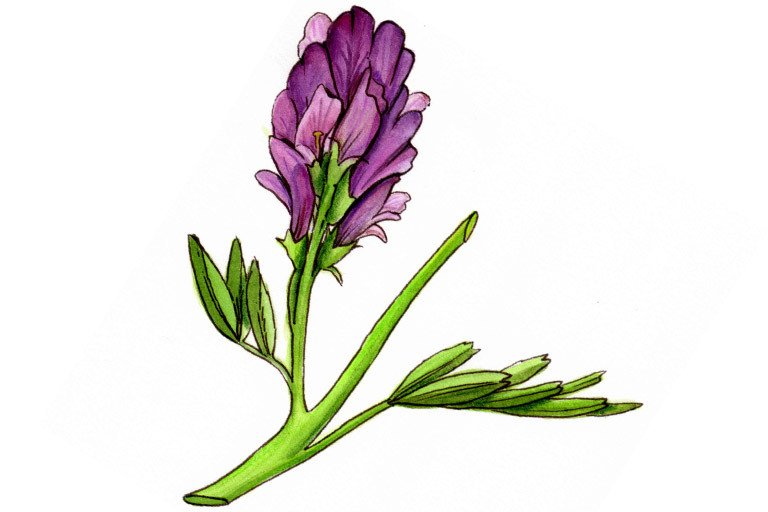
Common Names
- Buffalo Herb
- Lucerne
- Purple Medick
- Purple Medicle
- Purple Medic
For Patients & Caregivers
Tell your healthcare providers about any dietary supplements you’re taking, such as herbs, vitamins, minerals, and natural or home remedies. This will help them manage your care and keep you safe.
What is it?
Alfalfa may be effective at reducing cholesterol levels, but there is no evidence that it can treat cancer, and it has many side effects.
Alfalfa contains fiber and a substance called saponins, which are thought to bind with cholesterol in the body and may reduce cholesterol levels. Alfalfa plants also contain phytoestrogens, which act like some human hormones. In fact, alfalfa phytoestrogens caused the growth of estrogen-dependent breast cancer cells. Alfalfa seeds also contain a toxic amino acid, L-canavanine. Levels of this amino acid vary widely across various cultivations of plants, and decrease as the plant matures. It is thought that this amino acid may be responsible for alfalfa's ability to cause a relapse of lupus symptoms in patients who are in remission from the disease, and large levels of L-canavanine from alfalfa supplementation may have additional detrimental effects in humans.
What are the potential uses and benefits?
- To treat diabetes
Although alfalfa appears to lower blood glucose levels in animals, no studies have tested whether it has any significant effect in patients with diabetes. - To treat high cholesterol
Two small trials have shown that alfalfa supplements lower cholesterol levels in people with high cholesterol, but larger, controlled trials are necessary to confirm these results. - As a diuretic
This is not backed by experimental evidence. - To treat gastrointestinal disorders
No scientific evidence supports this use. - To treat asthma and hay fever
There are no studies to back this use. - To treat thyroid problems
No scientific evidence supports this use. - To increase lactation
Scientific evidence is lacking for this claim. - To promote menstruation
There are no studies to support this claim.
What are the side effects?
- Increased fecal volume and defecation frequency, loose stools and diarrhea as well as abdominal discomfort and intestinal gas have all been reported in patients, following supplementation with alfalfa.
What else do I need to know?
Patient Warnings:
- Alfalfa sprouts have been linked to a number of food poisoning (E. coli and Salmonella infection) outbreaks in California and Europe.
Do Not Take if:
- You are pregnant or nursing (Because of its hormonal effects, alfalfa should be avoided during pregnancy and nursing.)
- You have lupus (Patients with systematic lupus erythematosus should avoid alfalfa tablets because they may lead to relapse.)
- You have gout (Due to the high content of purines, alfalfa should be avoided in patients with gout.)
For Healthcare Professionals
Scientific Name
Clinical Summary
The leaves and seeds of this widely used food crop are thought to have diuretic properties, to be effective against diabetes, thyroid gland malfunction, arthritis, high cholesterol, and peptic ulcers (1), and to promote menstruation and lactation (2). Alfalfa is a popular treatment for asthma and hay fever (2). It is also claimed to be a source of vitamins A, C, E, and K and of the minerals, calcium, potassium, phosphorus, and iron (3). Alfalfa sprout extracts showed neuroprotective (15) (20) and estrogenic activities (9) (16) in preclinical studies. It was found to lower cholesterol levels in small uncontrolled trials (4) (5).
L-canavanine, a toxic amino acid present in alfalfa seeds, was shown to affect T cells (7). Whether high enough concentrations of this substance are obtained through supplementation is not clear (8). In another study, rats that were fed alfalfa were more susceptible to colon cancer, although such effects have not been observed in humans (18). Ingestion of contaminated alfalfa sprouts and seeds resulted in fatalities (10) and salmonellosis (12). Listeriosis has also been reported following consumption of contaminated alfalfa tablets (19).
Food Sources
Alfalfa seeds and sprouts are available around the world and used frequently as animal feed.
Purported Uses and Benefits
- Diabetes
- Cholesterol
- Diuretic
- GI disorders
- Asthma, allergies
- Thyroid
- Lactation
- Menstrual disorders
Mechanism of Action
Saponins contained in alfalfa act on the cardiovascular, nervous, and digestive systems (1). The hypocholesterolemic and hemolytic activity of the leaves and sprouts of alfalfa are attributed to a steroidal saponin fraction which, along with fiber contained within the plant, binds to cholesterol in vitro. Alkaloids such as stachydrine and l-homo-stachydrine found in the seed are thought responsible for alfalfa’s ability to promote menstrual discharge and for its lactogenic activity (2). Biochanin-A, an isoflavonoid constituent, blocks NF-κB activation by preventing phosphorylation and degradation of IκBα, leading to decreased expression of inducible nitric oxide synthase, thus preventing proliferation and inflammation (17).
Extracts from alfalfa preferentially served as agonists for estrogen receptor beta, and alfalfa increased estrogen-dependent MCF-7 breast cancer cell proliferation even more than did estradiol (9). The non-protein amino acid constituent, L-canavanine, constitutes 1.5% of the dry weight of alfalfa seeds and alfalfa sprouts. It has been shown to affect human T cells in vitro and induce hematologic and serologic abnormalities characteristic of systemic lupus erythematosus in monkeys (13). This is the proposed mechanism by which systemic lupus erythematosus relapse occurs in humans as well (7), although some researchers question whether L-canavanine concentrations in alfalfa are sufficient to cause this effect (8).
Warnings
Contraindications
Adverse Reactions
- Increased fecal volume and defecation frequency, loose stools and diarrhea as well as abdominal discomfort and intestinal gas have all been reported in patients, following supplementation with alfalfa (5).
Herb Lab Interactions
Alfalfa may increase serum urate and urea levels (5).